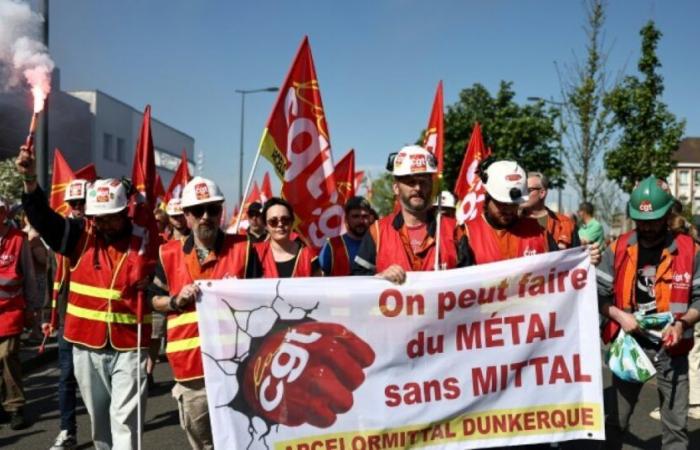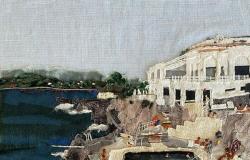
“We wonder what will happen to us”: hundreds of people, including worried ArcelorMittal employees, marched Thursday in Dunkirk to denounce the announced abolition of around 600 positions in France, especially on the Dunkerquois site which is the most affected.
To the sound of drums and in a cloud of red flags of the CGT, the demonstrators, some of whom in site helmet and red chasubles, chanted their anger in this port city.
“Let us confiscate the dividends”, “ArcelorMittal nationalization”, or even “Metal Metal”, we read on the posters, in reference to the Indian owner of the steel giant.
In the crowd, Bruno Copin, a maintenance worker for 37 years, fears for his end of career. “I would have liked to go back to retirement. I am 56 years old, if I am licensed, find a job will be a hassle,” he breathes, moved.
“Even if the job can be hard – we sweat, we get dirty – I’m happy to come and work in the morning,” says the worker who denounces “the enormous profits” of his boss.
Arnaud, 48, manager in electric maintenance, whose position is not directly threatened, came to support his colleagues. He says he is “worried” because for a few years “all the facilities” and “working conditions deteriorate”.
“There is almost no budget for maintenance, we are in a permanent fire mode. Our factory will crumble,” he says.
Marine Devestel, 33, has been working on the neighboring site of Mardyck for 13 years. It denounces a lack of clarity on the industrial future of the group.
“We think that this is the first wave of deletions. Mittal wants to relocate everything in India, the decarbonation project is not advancing, no project is launched”, according to her.
“I am the third generation to work at Arcelor after my grandfather, my mother and I would like to be able to end my career there,” adds the thirty-something. But we are “demotivated because we wonder what will happen to us. It is unfair, because we are relocated for the profits of billionaires”.
At his side, her mother Catherine Kucharski, 64, now retired after 40 years of house, is also worried. “If the steel industry dies here, Dunkirk will become a dead city.”
-– “nationalisation” –
“We are soon announced 300 job cuts”, in Dunkirk, “we are afraid that it then continues until the factory closed”, fears further Jean-Baptiste François, logistics technician for 15 years. He wants “more franchise and honesty” leaders “on the situation and what is preparing” on his site.
For Gaëtan Lecocq, from the CGT of ArcelorMittal Dunkirk, such a closure would be an “industrial, social tsunami”. He called for a new mobilization in Paris on May 13 during a central CSE.
Several leftist political leaders have joined the movement, including the first secretary of the Socialist Party Olivier Faure, the various left deputy François Ruffin or Marine Tondelier, national secretary of environmentalists.
They demand the revival of the site decarbonation project, customs protection in the face of increased competition from Chinese steel, an entry from the state to capital and refuse any deletion of position.
The management of ArcelorMittal must be summoned “within two or three weeks” before a parliamentary commission of inquiry into the failures of the public authorities in the face of the multiplication of layoffs, announces to Dunkirk the environmental deputy Benjamin Lucas.
The PS plans to table “in the coming days” a proposal for a law of “under supervision” of the state of the ArcelorMittal site in Dunkirk.
The rebellious deputy Aurélie found, accuses ArcelorMittal to organize the “sabotage” of the sites and “the fall of French metallurgy”. “We will be alongside employees in struggle until we obtain the nationalization of high stoves,” she commits.
The plan presented on April 23 by the steelmaker provides for the abolition of some 600 positions in the north and east of France.
In addition to Dunkirk and Mardyck, these deletions concern the Florange factory (Moselle), and four other sites, entities employing some 7,100 employees.







